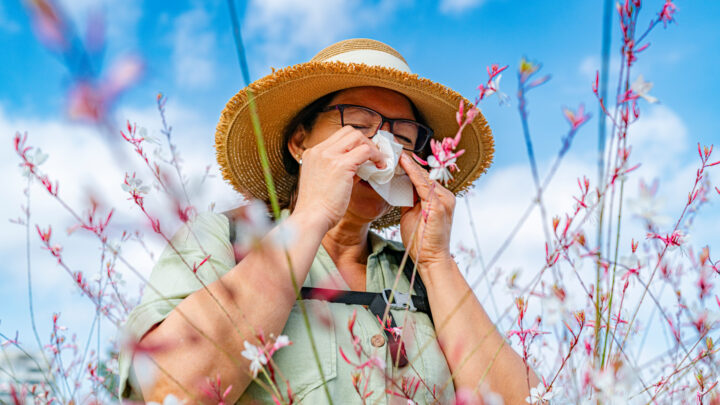
Mature woman has an allergic reaction to flowers pollen
With spring now in full swing, the days are getting warmer, the air is filled with the scent of blossoms, and allergy sufferers across the country are starting to feel the familiar itch and sneeze. While many will no doubt welcome the more comfortable temperatures and the blossoming of springtime flowers, for the roughly 3.1 million people who suffer from seasonal allergies, this time of year can be a nightmare.
For those grappling with springtime allergies, the symptoms can prove quite challenging. Spring allergens, including tree and grass pollens, have the potential to induce a range of allergy-related discomforts such as sneezing, a runny or congested nose, swollen mucous membranes, coughing, and itchy, watery eyes. Moreover, seasonal allergies can extend their reach to affect the skin, causing rashes, and contact with certain grasses and other plants may lead to the development of skin rashes.
In order to ensure springtime allergies don’t get the best of you this year, understanding the root causes and exploring natural remedies can be key strategies. This article delves into what triggers these allergies and offers natural solutions that allergy sufferers swear by.
Understanding Springtime Allergies
While those suffering from allergies at this time of year are no doubt clamoring for the secret to ending their allergy woes, it’s important to understand what is causing these symptoms. Gaining a clear understanding of the root causes behind allergies empowers you to proactively steer clear of these triggers, ultimately reducing the likelihood of distressing flare-ups.
The main culprit behind spring allergies is pollen. Trees, grasses, and weeds release these tiny particles into the air for plant fertilization. But when they enter your nose, they trigger the body’s defense system. The immune system mistakenly thinks pollen is harmful and sends out antibodies to attack it. This sets off the release of histamines in the blood, which causes familiar allergy symptoms like a runny nose and itchy eyes. Pollen can travel long distances, so it’s not just about the plants in your immediate area.
Natural Remedies to Alleviate Springtime Allergies
Now that we understand what causes springtime allergies, let’s explore the natural remedies that can ease those inevitable flare-ups. Armed with knowledge and natural remedies, you can reclaim the pleasures of spring without letting allergies hold you back.
Local Honey
Consuming locally sourced honey may help build tolerance to local pollen. A 2013 study found that
“a high dose improves the overall and individual symptoms of allergic rhinitis, and it could serve as a complementary therapy for allergic rhinitis.”
The theory is that by exposing yourself to small amounts of local allergens through honey, you can reduce your sensitivity to them over time. Be sure to choose honey from your specific region for the best results.
Butterbur
Butterbur is an herbal supplement that has been used traditionally to treat allergies and asthma. It may help reduce nasal symptoms, but it’s essential to consult a healthcare professional before using it, as there can be side effects and it could interact with other medications. Recent research suggests that using butterbur might be a good way to treat nasal allergies when taken as an oil extract or in pill form.
A previous study with people who suffer from allergies showed that taking butterbur tablets for a week significantly improved their allergy symptoms. After five days of treatment, the participants had fewer allergy-triggering substances like leukotrienes and histamines in their bodies.
Herbal Teas
Certain herbal teas can provide relief from allergy symptoms. Chamomile tea can have anti-inflammatory properties and help with congestion. Peppermint tea can soothe irritated airways and sinuses. Green tea contains antioxidants that may help boost your immune system.
Stay Hydrated
Drinking plenty of water can help thin mucus secretions and soothe irritated throat and nasal passages. Staying hydrated is a simple yet effective way to support your body’s natural defense mechanisms. Additionally, when you experience common allergy symptoms like a runny nose, itchy eyes, and sneezing, your body loses more fluids. This underscores the importance of staying hydrated to help fight allergies.
Probiotics
Probiotics, often found in yogurt or in supplement form, can help promote a healthy balance of gut bacteria. Some research suggests that a balanced gut microbiome can influence your immune system and potentially reduce allergy symptoms.
A 2016 review looked at how probiotics affect allergies, specifically allergic rhinitis. It found that probiotics can significantly improve symptoms like stuffy nose and itchy eyes during allergy seasons, and they also seem to make people feel better overall.
Eat Foods High in Vitamin C
Maintaining allergy resistance involves keeping your immune system strong and resilient. One effective strategy is incorporating antioxidant-rich foods packed with Vitamin C into your diet. This can be effortlessly achieved by introducing freshly squeezed lemon juice or a dash of apple cider vinegar to your morning water or by enjoying citrus fruits.
Saline Nasal Sprays
Saline nasal sprays or rinses can help keep nasal passages moist and wash away allergens. They can provide relief from congestion and help reduce allergy symptoms and are readily available over the counter.
With these effective natural remedies at your fingertips, you can relish all that spring has to offer while ensuring allergies don’t spoil your fun.
IMPORTANT LEGAL INFO: This article is of a general nature and FYI only, because it doesn’t take into account your personal health requirements or existing medical conditions. That means it’s not personalized health advice and shouldn’t be relied upon as if it is. Before making a health-related decision, you should work out if the info is appropriate for your situation and get professional medical advice.





